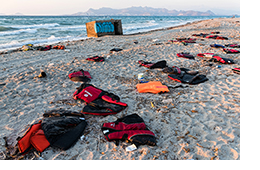| If you can't view the email, please click here. |
|
|
|
Spring 2016 Vol. 15 No. 1 |
|
From the Desk of the Editor
Süreya Martha Köprülü
"This issue of TPQ takes stock of important geopolitical shifts in the Eastern Mediterranean region, from the exploitation of newly discovered energy resources and emerging regional alliances to conflict resolution efforts and migration flows. While parsing the short and longer-term implications of the deteriorating security environment in the region, our authors indicate that there are also opportunities for cooperation."
"The Turkish perspective on the Eastern Mediterranean region is colored by its vital need to reassert its regional role, rebuild its relations with key neighbors, and confront manifold challenges both at home and abroad. With its Syria policy in disarray and the diplomatic fallout from damaged relations with Russia continuing to send shock waves through the country's tourism, energy, and economy sectors, Ankara is actively attempting to recalibrate its foreign policy."
|
|
Emerging Security Challenges in NATO's South:
How Can the Alliance Respond?
Sorin Ducaru 
"For the first time in its history, the Alliance is dealing simultaneously with major threats from two strategic directions. Preeminent among these threats are the provocative actions of a more aggressive and assertive Russia, which continues to display little regard for international law, and the challenges posed by an unstable Middle East and North Africa right on NATO's doorstep."
"If NATO is serious about projecting stability to its southern borders, a 'one-size-fits-all' approach will not work. The Alliance needs to adopt a multi-layered strategy that takes into account regional specifics."
"NATO needs to become more proactive. Over the past few years, we have put increasing emphasis on examining non-traditional challenges (…) But more needs to be done. For example, we need to put even greater emphasis on intelligence-sharing. We also need to focus more strongly on strategic analysis and on harnessing the expertise of the private sector, for example on energy security and cyber defense. Last, but certainly not least, the North Atlantic Council also needs to devote more time to discussing disturbing security developments."
|
|
|
The Eastern Mediterranean Vortex
Ian O. Lesser

"The Eastern Mediterranean is the place where Europe's post-enlargement external policy is being formed and tested. Migration is at the top of the European agenda as a political, economic, and security concern. The EU's ability to manage the refugee crisis, not just in the Aegean, but also across a much larger Mediterranean area with multiple and long-term migration pressures, could prove politically existential for national governments."
"Disenchantment with business as usual with Saudi Arabia and Qatar, reduced anxiety about Gulf energy (it will never disappear entirely), and the rise of security concerns in the Levant and North Africa, could encourage a broader westward shift in America's Middle Eastern strategy. This would unfold against the backdrop of a renewed American investment in European security, and would imply a net shift from the Gulf to the Mediterranean in terms of strategy and presence."
"The collapse of the security order in Turkey's neighborhood has understandably thrown Turkish policy into disarray. Russia has emerged as a geopolitical competitor and a tangible source of risk in a way that few would have predicted. Iran's involvement in the Levant, directly and via proxies such as Hezbollah, raises the uncomfortable specter of growing Turkish-Iranian friction."
|
|
|
Turkey's Loaded Discussion on System Change:
Presidentialism vs. Parliamentarism
Birol Akgün

"The ruling Justice and Development Party (AK Party) government has been pushing for a presidential system since its establishment, and Recep Tayyip Erdoğan, its founding leader and now President of the Republic since August 2014, firmly believes that the best way to ensure democratic stability in Turkey is to rewrite the Turkish military-made 1982 Constitution and implement a well-defined presidential system."
"What is needed in Turkey at this critical conjuncture of its history is an all-inclusive, constructive, and informed public debate that no responsible political actor should be exempt from participating in."
|
|
|
The Reinvention of Jihadism in the Middle East
Peter Harling

"ISIL introduces a new dynamic and sets an effective precedent, which will no doubt affect, if not reshape, the jihadist movement more broadly. A first jihadist 'success' in a crumbling Arab world is a turning point in and of itself. Although it may seem relatively easy to contain in places like eastern Syria and north-western Iraq, it would be naïve to underestimate the real threat it poses, due to its ability to adapt, replicate, scale up, inspire others, and leverage its opponents' reactions to its advantage."
"The digitalization of the world creates a connected, wireless jihad, in which fighters articulate on social media their own gratifying self-image, easily communicate with like-minded kin back home, and can even hope to lure their good company to their side. Many appear to fire more tweets than bullets."
|
|
|
Cyprus Settlement Negotiations: From Euphoria to Reality
Harry Tzimitras & Ayla Gürel

"Prospects for a settlement in this latest episode of the negotiations have been widely seen as being better than at any time in at least the last 10 years. This is largely because the interlocutors, Greek Cypriot leader Nicos Anastasiades and Turkish Cypriot leader Mustafa Akıncı, are both known to be committed to reaching an agreement, which has been a rarity in the Cyprus talks."
"The serious challenges the region is currently facing point to the absolute necessity for cooperation and energy could be the ideal facilitator. At the same time, if the regional states adopt short-sighted, selfish policies, insensitive to regional realities, the risk of energy becoming a trigger for conflict instead of an agent for partnership is obvious."
|
|
|
Pivoting Energy Relations in the Eastern Mediterranean
Suzanne Carlson

"The Zohr natural gas field has drastically decreased Egypt's demand for gas, forcing Israel and Cyprus to find other export markets. While Turkey is the most economically viable route for a pipeline at a time when oil and gas financing is weak, geopolitical issues between Ankara and the Cypriot and Israeli governments would have to be resolved for such a project to be implemented."
"The EU, seeking to diversify its energy import options away from Russia and resolve the Cyprus situation, is likely to support a potential Cyprus-Israel-Turkey pipeline, as it includes the Cyprus-Crete-Greece pipeline on its list of projects of common interest. While the potential imports are only a drop in the bucket compared to its vast needs, the EU sees varied energy import sources as a high priority, and the bloc's support could only help push a rapprochement forward."
|
|
|
The Case of the Chemicals Industry & the Modern Industrial Economy
Howard Chase

"Over the past decade, Europe's share of total world economic growth has been around 25 percent, probably more than most people think. However, when it comes to the chemicals sector, Europe has only managed to secure about two percent of total world growth. In other words, Europe has missed out on more than 20 percent of growth in its own backyard."
"If handled correctly, the circular economy could provide Turkish and European manufacturing with a valuable opportunity for innovation and growth, but there is also the risk of adding new regulatory and cost burdens that will damage industrial competitiveness. We see the need for Turkey and the EU's legislators to support rather than damage competitiveness, and it is vital that all the stakeholders have and make full use of the opportunity to be heard in the policy debate."
|
|
|
Turkey Needs a New Social Contract
Aykan Erdemir

"Turkey's failed attempts for a new bill of rights seems to have eroded enthusiasm for any further effort. Much of the Turkish public still recognizes the need for amending the constitution, but there are no viable strategies to overcome the political and social constraints that have thus far prevented compromise."
"At Turkey's current juncture, any push for a wholesale drafting of a new constitution is likely to undermine efforts to build trust. Turkey's path to democratic governance as well as civil rights and liberties requires patience and taking small, incremental steps."
|
|
|
Changing Military Balances in the Eastern Mediterranean:
Implications for Turkey
Serhat Güvenç & Sıtkı Egeli

"Throughout much of the Cold War, the Eastern Mediterranean remained a mare nostrum for the US beginning with the formation of the Sixth Task Fleet in 1948. Moscow's decision to challenge the naval power hierarchy there was a direct consequence of the Cuban Missile Crisis in 1962."
"Turkey's ability to act on its own in the three littorals surrounding its landmass is extremely limited today. Shifting naval balances prompted a reconsideration of Turkey's policies and priorities in adjacent maritime environments. The change in the Turkish position is the most striking in the Black Sea."
|
|
|
Cyber Power in the Changing Middle East
Lior Tabansky

"For the first time in history, the total value of Israeli cyber security exports outpaced Israeli defense exports. The dynamic innovation continues. Israeli society produced some 300 cyber security start-ups in 2015, up from 150 in 2012."
"As cyber power becomes an essential instrument in international security, Turkey's cyber security deficiencies may prove crucial. Russian security thinking can be innovative, unpredictable, and effective. Moscow apparently now has the ability to fulfill longstanding ambitions."
|
|
|
Issues in Turkey's Post-Soviet Policy
David Erkomaishvili

"Ankara's reasons for being involved in dealing with the post-Soviet space were economic at first. Creating harmonized economic structures was central to recovery in the region. That also provided an opportunity for building a political alignment under Turkish leadership should the need arise."
"With the rise of the Justice and Development Party (AKP) in Turkey and the inception of Ahmet Davutoğlu's powerful foreign policy concept of reaching out to the neighborhood, Turkey has set its interests on a collision course with those of Russia in the post-Soviet space. The most important point is that Russia and Turkey have witnessed an almost simultaneous rise to the status of regional power."
|
|
|
Tackling the Syrian Refugee Crisis: Prospects & Challenges
Semuhi Sinanoğlu, Irmak Taner & Erhan Aslan

"Legally, Turkey might need to reconsider granting full citizenship status instead of temporary protection status. Calling Syrians in Turkey 'guests' or 'people under temporary protection' does not provide long-term sustainable answers for the core issues."
"In view of the number of refugees and the scope of challenges Turkey faces, the creation of a ministry solely to deal with immigration issues should be considered. Since the formation of a ministry will take some time to work through in terms of dividing responsibilities with other ministries and designating its place in the bureaucracy, bureaucratic procedures should be simplified and the level of decision-making should be elevated in the interim period."
|
|
|
Have a counter-argument to one of the authors’ views?
Share it on TPQ’s Debates section. For guidelines click here. |
|
|
The Premium Corporate Sponsor of this Issue
 |
|
|
This Issue's Sponsor
 |
|
|
Thanks to our partners |
 |
 |
|
|
 |
Address: Kadir Has Üniversitesi Cibali Kampüsü Sosyal Sorumluluk Binası ( Beyaz Ev )
Küçük Mustafa Paşa Mah. Seferikoz Sok. No:14 Kat.1 Fatih- İstanbul
Phone: +90 212 621 4442 - +90 212 621 9258 Fax: +90 212 531 8718 info@turkishpolicy.com
Click to unsubscribe |
|
|
